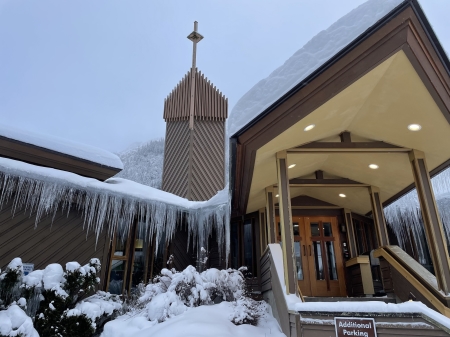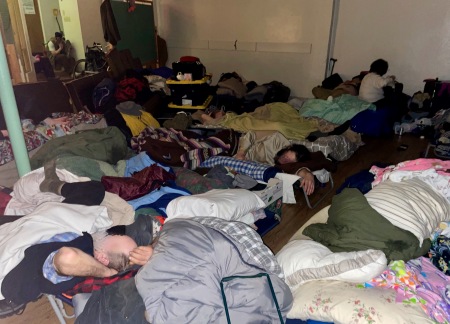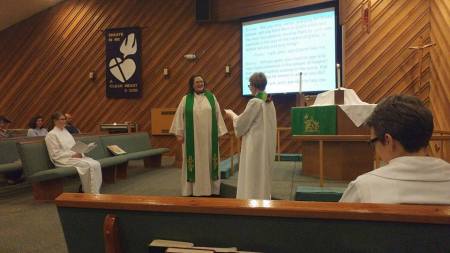Divided church in Alaskan city with bitter winters nixes cold weather shelter for the homeless

After opening their doors for two years to help a growing population of homeless people find emergency shelter during dangerously cold periods of the year, the small congregation of Resurrection Lutheran Church in Alaska’s capital, Juneau, voted not once but twice against using their property to help keep the homeless warm.
The church's pastor, Karen Perkins, who ran the shelter along with her husband, Brad, told The Christian Post that she is now worried that some of the most vulnerable residents of Alaska’s capital won’t have a place to go in the community that can only be accessed via boat or plane when the climate gets unbearably cold.
Juneau, which spans 3,255 square miles, is the largest capital city in the United States by land area but has a population of just over 32,000, according to Travel Juneau. Its climate is described as subarctic which means it has severe winters, no dry season, and cool short summers with strong seasonality.
In late June, when the congregation, which has 54 voting members, first decided on whether they would apply to be a warming shelter for the homeless for the third consecutive year, the congregation’s President Karen Lawfer reported that voting was split 14-14, according to a letter to the congregation dated Aug. 30.

“The city did not receive any bids for the CWES this season. RLC was approached by the city and borough of Juneau asking us to discuss the bid, so Pastor Karen, Brad Perkins (CWES manager for two seasons at RLC), and I met with them on Aug. 3. We discussed items that were of concern for us, but also shared that there were multiple opinions at RLC unrelated to the details of the bid,” Lawfer said in the letter, noting that no organization in the city had applied to be an emergency cold weather shelter.
She added that if no organization offered their property to house the homeless, the only available option the city has is a decommissioned bus.
“The city has explored many options, and, at the last Assembly meeting, they presented their final option. That was to idle a decommissioned bus during cold weather days. The bus would fit 35 people and they would have to sit (not lay down) for the night. This was not well received but they are out of options,” Lawfer said.
She noted that the city asked to talk with congregants about the situation directly again and on Sept. 10, Deputy City Manager Robert Barr made his case to them, explaining why the city is unable to provide emergency cold weather shelter, Alaska Public Media reported.
This time even more people voted against the idea. Of the 31 congregants who voted, 18 opposed the shelter.
“I’m really very sad and disheartened,” Lawfer told APM.
“Now that there’s nobody else to do it, I don’t know what they’re thinking,” she added. “I honestly don’t know what they’re thinking.”

When asked why the congregants would suddenly oppose running the emergency shelter after doing it for two years in a row, Perkins told CP most of the congregants were away from the church due to the COVID-19 pandemic in the last two years that they ran the shelter.
She said even though the members did not openly voice them, she suspects that when they returned to in-person worship there were some concerns about how operating the shelter had impacted the church space and the neighborhood around it.
“When the eviction moratorium ended, all of a sudden, there were a lot of people who were homeless, so there was just this sudden spike, and the staff was not able to manage as well, keep things clean, keeping an eye on people as much,” Perkins said.
“And so, what happened was, there was more loitering. There was more drug dealing, not in the shelter, but that was happening around the shelter. There was more debris around the shelter that was harder to manage,” she added.
“Most of our model is prevention, and when there are 70 people, it's really hard for staff to keep an eye on it. ... I was getting called in a lot in the middle of the night because I needed to be there. And I think all those things together made it look overwhelming and shocking. The building was not being respected … the way a church facility [should],” she said.
Despite these problems, Perkins told CP she still supports the church operating the shelter because she believes the concerns are not insurmountable. The cost of not providing it, she said, would likely come at a greater cost to the community.
The Juneau pastor, who has been serving the congregation since 2017, explained that because the city does not have counties that provide certain services, nonprofits are contracted to provide emergency cold weather shelters that are completely funded by the government or by a combination of government money and donations. Each nonprofit is also allowed to set their own criteria for acceptance into their shelter.
The church, says Perkins, operates what is known as a low-barrier shelter, which according to Law Insider, does not require a criminal background check, credit check or income verification, identification, sobriety, or participation in a specific program, for anyone in need of housing to stay.
She said many of the homeless served by the church’s shelter are individuals with significant behavioral health issues or addictions that other organizations reject from long-term shelters.
“The emergency shelter is a low barrier shelter and low barrier shelters are very different from a lot of other shelters because low barrier specifically means that we are taking people. We are removing as many barriers as possible because we want to keep people from freezing to death,” she said.
“Whether or not you're intoxicated we want to keep you from freezing to death. Whether or not you're obnoxious. A lot of the people who end up coming to our shelter are people who for one reason or another are not able to comply with the requirements or they either don't fit in,” Perkins said.
The Resurrection Lutheran Church pastor explained that the contract that they had with the city is that the shelter would at a minimum, be open whenever the temperature falls below 32 degrees Fahrenheit. She said they found themselves operating the whole year because they calculated that it would have turned out to be more expensive and disruptive for the community, to turn the homeless out of the shelter for a few days.
“We were open the whole season — from Oct. 21 through April 21 when the temperatures drop to 32° or below — but the contract is that we are at a minimum open when it's 32 or below. And there are people who, I think, were frustrated that we didn't close,” Perkins said.
“There are people that we serve that have missing fingers and or get hospitalized for a month because of frostbite or trench foot or something like that, which the city does own the hospital and so that is a community cost. And so trying to estimate what it is worth to close versus what is it worth to stay open is just how we have to make those judgments,” she added.
Perkins wants to find a solution to balance the needs of her congregation and her passion for the most vulnerable in her community because she understands that “everybody is grieving because everybody lost during COVID.”
“People came out of COVID grieving and lonely and a place that people want, I think wanted to go and feel safe was the church,” she said.
“To have your church be dramatically changed, I think is a grief issue,” Perkins continued. “That's one of those things that I said isn't said out loud and I can't, I can't speak for what's going on in somebody's heart. … You want your church to be the way you want it to be.”
Contact: leonardo.blair@christianpost.com Follow Leonardo Blair on Twitter: @leoblair Follow Leonardo Blair on Facebook: LeoBlairChristianPost





















